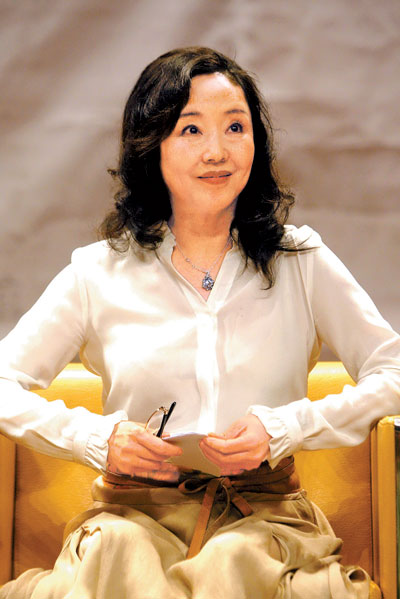
Tan Yifan
cicitan2011@gmail.com
YAN GELING, the famed American-Chinese novelist and scriptwriter, recently talked about her writing career and gave writing tips to an audience at the Shenzhen Library.
After writing 43 novels, Yan, 56, said life experience played a key role in a writer’s creativity.
“I was lucky to have built a good literature foundation when I was young,” Yan said. “I read a lot of books in my grandparents’ study and started to explore the world behind the words — the inner world of writers and the characters. But what triggered my desire to put my thoughts on paper was the things I have seen, witnessed and experienced.”
Born during the Cultural Revolution (1966-1976), Yan was forced to leave home at the age of 12 and has to bear many family misfortunes. Her parents divorced when she was still young. Her grandfather was thrown in jail and later committed suicide.
“I was a wild child, but I had to enter the adult world too soon and began to learn the truth about humanity,” Yan said.
According to Yan, most of her writing stems from how she perceives human values.
“I didn’t receive enough formal education. I was only in primary school when the Cultural Revolution started. Most of my time was spent following my peers and watching people being tortured and killing themselves,” Yan recalled.
“Two scenes struck my heart. One was seeing an old couple jump from the roof of a building. They must have loved each other so deeply but had to commit suicide. After a “thud,” the bodies hit the ground and several candy wrappers were swirling around in the sky. I believe they had spent the last of their food quota on the candy and shared them before they jumped. That day, the air was full of the sweet, sticky smell of blood, which comes back to my mind often,” Yan said. “The scene was sad but beautiful. It reminds me of the cruelty of life and the beauty of love.
“Another scene was when I visited a local hospital with some of my female friends. We saw a woman naked in a corridor. No one came to take care of her. Instead, people, especially men who wouldn’t have spared her a glance before, stared straight at her naked behind. It made me sick,” Yan said. “Later, I added that scene to my novel ‘Tuoxie Dadui,’ in which the character learns about the dark side of human nature.
“Experiences like that convinced me that humanity was cruel and evil, and that influenced my early writing,” she said.
Yan joined the art troupe of the army when she was 12. She spent her time there as a dancer and performer. In 1979, when the war against Vietnam began, she volunteered to join it as a reporter. Her views later changed as she joined the Anti-Vietnamese War movement.
“I wrote plays when I was in the army. When they encouraged young people to join the war, I was very excited and decided to be a reporter,” Yan said.
“I met many new faces there in Vietnam. One day, a boy whose legs were injured by a bomb helped us find some artillery in spite of his pain. I was always impressed by that. He was so courageous and heroic to me. The common people I met during the war somehow showed me the positive side of humanity. My belief that all humans are basically evil started to shake, and I began to wonder what triggered that change,” she said.
Her experience in Vietnam led her to become a full-time writer. The army’s writers’ group accepted Yan after she returned from the battlefield. She became a publishing writer in her 20s.
After a short marriage, Yan got divorced and decided to travel to the United States.
“I was about 30 years old when I made the decision to pursue my studies in the United States,” Yan recalled. “I tried my best to learn English and prepared everything to move to a new country.”
She was admitted to Columbia University and discovered a brand-new life there as an international student.
“My life felt normal in America, a place where people had never heard my name. I worked part-time in restaurants and in people’s homes as a nurse,” she said. “I had to learn to live as a poor immigrant.”
“During that time, life as a Chinese immigrant was hard and people treated me with disrespect. It was those experiences that inspired me to write ‘Siao Yu,’ a story about a kind immigrant girl who got embroiled in fraud and a lawsuit with an old white woman,” Yan said.
That novel changed her life when director Ang Lee bought the copyright and adapted it into a movie.
“I then became a scriptwriter for Lee. I was no longer a poor student. I later met my husband,” she said.
Life in the United States helped Yan focus on the stories of immigrants. She wrote novels such as “The Lost Daughter of Happiness,” a story about a secret Chinese immigrant.
“Being married to an American diplomat has given me the opportunity to travel around the world and think about my home country and the past. When I wrote the novel ‘The Criminal Lu Yanshi,’ I combined my grandfather’s story with another relative’s story and tried to depict the time in which they lived,” she said. “I wrote nearly 400,000 characters for that story and then deleted about 100,000 of them.”
The story was based on her memories of the Cultural Revolution.
“After a period of exploring the world outside of my childhood memories, now I want to write something about China, about my family and myself,” she said. “It is time to get back to novel writing. China will always be the origin of my inspiration.”
|

